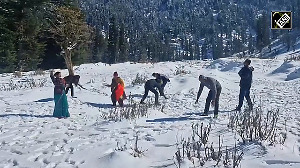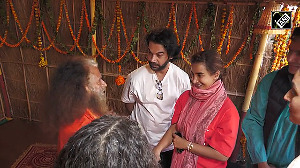Influential US lawmaker Gary Ackerman, chairman of the House Foreign Affairs Subcommittee on the Middle East and South Asia, has exhorted the people of India not to be "bullied," by a "radical view," that seeks to torpedo the Indo-US civilian nuclear deal.
The Congressman's remarks came even as Prime Minister Manmohan Singh on Monday informed President George Bush that there were difficulties in operationalizing the deal following opposition from the Communist allies of his government.
Ackerman, New York Democrat, and two-time former co-chair of the Congressional Caucus on India and Indian Americans, keynoting the US-India Business Council and Federation of Indian Chambers of Commerce and Industry co-sponsored luncheon for the India-US Forum of Parliamentarians, asserted, "I want to say this deal is important. It is important to us, it is important to India, it is important to the region, it is important to the world."
"We have come too far to let this ball drop," he said, and added, "So much is at stake."
Ackerman said, "Do not let the radical view hijack what is in your nation's best interest, I say to my American and Indian friends. In order for progress to be made, courage needs to be shown."
The lawmaker, who was among the authors of the enabling legislation -- called the Hyde Act -- to facilitate the nuclear agreement that was approved overwhelmingly by both the House and Senate and signed into law by the President last December, said, "The businesspeople who are among us today -- under whose umbrella we assemble today --are not just financial mercenaries, (but) they do have the interests of their peoples in mind. There is money to be made in progress, (and) there is also peace and security to be made in progress, if progress is made the right way."
Ackerman said, "The ball is back in your (India's) court. To those who would try to bully from a minority position, to tell the majority of people what is in their national interests and that if they do not do as that group says, that they are being bullied, are themselves the bullies."
In what could even be construed as a message to the Dr Singh, Ackerman said, "Do not cave in. I don't know how you solve that problem in a democracy. I don't know how we solve this, but I know that it gets solved when good people who have right and justice at their side agree on the understanding of the issue, and who are of goodwill and good character are willing to have the courage to stand up and say, 'This is the right thing to do and we will find the right path in which to do it'."
He acknowledged that "the road might be a little bit longer that we anticipated at first, but it is too important a road not to travel, and we are going to travel it together."
Meanwhile, senior Bush administration officials scrupulously eschewed making any public comment for fear of compounding the opposition to the deal in India -- which could be perceived as putting pressure on New Delhi to expedite the agreement -- but privately expressed utter disappointment over the Manmohan Singh government all but throwing in the towel and did not hold out much hope even though there is another meeting scheduled for October 22 by the various parties in New Delhi.
These officials told rediff.com that Dr Singh informing President Bush of the difficulties to operationalize the deal, and earlier External Affairs Minister Pranab Mukherjee conveying similar sentiments to US Ambassador to India David Mulford, 'shows that the writing is on the wall," in terms of the deal being in "deep trouble," and all but dead.
Publicly, State Department spokesman Tom Casey peppered with questions on whether the deal was comatose, said, "I will leave it to Indian officials to talk about their own internal political discussions on this."
"As you know, we believe that this is an arrangement that is a positive one and a good one for the United States, for India and for the broader efforts of nonproliferation," he said.
Casey said, "Certainly, there are steps that Nick (Nicholas Burns, Under Secretary of State and the chief US interlocutor of the deal) talked to you about previously that the Indian government will need to take and that we will need to take on our side as well to complete this."
"But in terms of where people are or what discussions are or how that is proceeding within India's political system, I am just going to leave it to them," he added.






 © 2025
© 2025